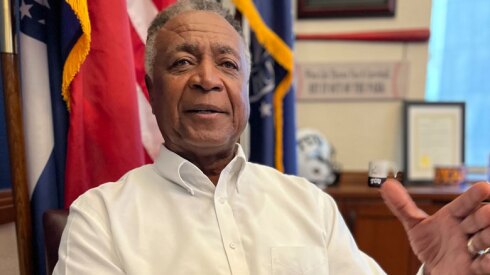Latest News
Slow rollout of the federal program has frustrated lawmakers, especially those in Michigan, which received $110 million through fiscal year 2026 for EV expansion but has funded no new power stations.
In a June poll, 84 percent of registered Nevada voters supported implementing voter ID rules. Some studies indicate ID requirements impede access, but evidence is mixed.
Gov. Greg Abbott and Lt. Gov. Dan Patrick want $5 billion more to expand a low-interest loan program for natural gas power plant construction “as soon as possible.”
Frank White was a Hall of Fame second baseman for the Royals. As county executive, he persuaded voters that sales taxes for a new stadium were a bad idea.
Struggling downtowns can embrace a new role as knowledge centers of a changed economy.
Future in Context
State lawmakers are working to define key terms and address risks as AI gets integrated into everyday life. California state Sen. Thomas Umberg talks about balancing regulation and innovation.
Homeowners are being squeezed out of affordable coverage. Sustainable intergovernmental partnerships with the insurance industry offer a solution. And there may be a role for state and local pension funds.
A study found that students across Texas who were taught by uncertified teachers lost the equivalent of about four months of learning in reading and three months in math. The state is becoming more reliant on uncertified teachers to fill vacancies.
Since 2010, 149 rural hospitals across the U.S. have either closed or stopped providing in-patient care. Often, communities are left with the empty husk of a hospital, but some communities have found ways to repurpose the buildings.
At least four cities across the state are replacing traditional Fourth of July firework displays with laser and drone shows.
Cash comprised 16 percent of payments during a month-long survey in 2023, compared to 31 percent seven years prior. But cash still remains pervasive among lower-income and older consumers.
The bills, which passed with bipartisan support, would have made it easier for felons who’d served time to re-enter society successfully. But Gov. DeSantis said they would reward criminals.
The Court found that there is no constitutional right to sleep outdoors or in cars. In dissent, liberal justices argued that sleep is a necessity that's effectively being criminalized.
Most abortions are now illegal in the state. A ban passed last year had been held up by a lower court’s injunction but justices ruled Friday, 4-3, that it can stand.
Urban interstate highways displaced hundreds of thousands of households, destroyed neighborhoods and enforced racial segregation, and they continue to harm low-income communities. We need to ameliorate this tragic history.
Vermont will charge $89 a year for registered electric vehicles, directing revenue to more charging stations. It’s among a handful of states with both incentives and fees for EV owners.
Breaking a years-long impasse, the Senate voted overwhelmingly to increase transparency for the governor and lawmakers. The bill still offers them some loopholes, however.
Deloitte has Medicaid contracts with half the states worth at least $5 billion. Critics charge the company with errors that have delayed care.
The new agency will combine programs that provide services for children under 6, which had primarily been divided among three different departments.
There are strong models for combating youthful disillusionment. San Francisco’s Youth Commission should be replicated across the country and a White House Office of Young Americans could address issues that affect everyone.
In the midst of a “skills tsunami,” agencies and their workers understand the problems better than central HR offices do. And workforce planning should focus on local labor markets.
A Shasta County supervisor was nearly recalled and the county’s longtime elections chief stepped down last month, with stress from death threats causing her heart problems.
Justices found that a federal statute that bans bribery does not apply to “gratuities” paid to elected officials for past acts. The case pertained to a former mayor but has implications for charges against former Illinois House Speaker Michael Madigan.
A federal judge has ordered the state to release unrepresented defendants, with about 2,500 now out of custody as a result. The state is now hiring more attorneys rather than relying on contracts with private defenders.
Hospitals stuck with unpaid bills will sometimes sell to debt collectors at a discount. The county’s investment could erase 100 times as much in medical debt.
A dozen states have joined a compact to give physician assistants a universal license. It's not a complete solution for the shortage of primary-care doctors, but it should help.
The liberal/moderate/conservative labels we give ourselves reveal little about what Americans actually want out of policy and government. More progress can be made at the community level, where tribal labels are less relevant.
A recently-expanded law covers more than 12,000 miles of road that account for 60 percent of all miles driven in the state. As part of its climate strategy, Minnesota hopes to reduce driving 20 percent by 2050.
A new poll found that roughly three-quarters of registered voters would like to see term limits enacted or shortened for county supervisors, district attorneys and sheriffs.
Nebraska’s Jump Start Scholarships program offers up to 100 percent tuition reimbursement along with signing bonuses for high school graduates to pursue degrees.
Sponsored
-
Sponsored
Most Read










































